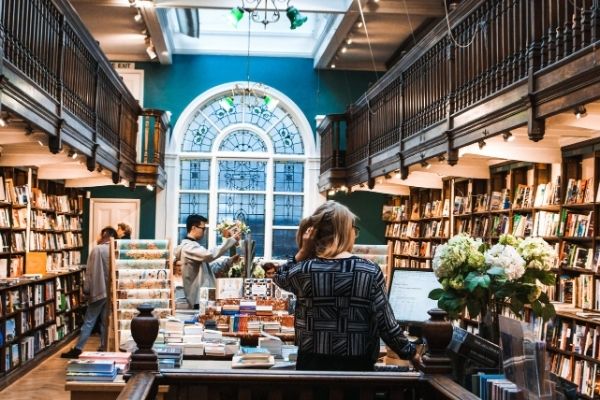What is Carolyn Veldstra Reading?
By Carolyn Veldstra
What I’m Reading: How to Pronounce Knife by Souvankham Thammavongsa
This was one of the first books I bought when local bookstores reopened to in-person browsing in June. Despite the masks that caused our glasses to fog with every breath, the hand sanitizer foot pump at the door, and the request that we limit our browsing to 15 minutes, stepping into a bookstore felt like the most normal thing my partner and I had done in the months since the pandemic had left us parenting, working, and managing our perpetual anxiety from a small two-bedroom apartment in a largely shut down city. We were desperate and gluttonous and bought five books between us; How To Pronounce Knife was the first of these I read.

In the early weeks of the pandemic, I attended a Zoom book launch for this collection of short stories at which Thammavongsa read a short excerpt from the last story. In that section, a young Lao woman looks through the peephole in her front door at her date for a school dance—a popular 14 year-old boy. The lights are off in the house. She watches him shift awkwardly on the stoop, becoming frustrated and pulling at his hair when he realizes the door is locked and no one is going to open it. As he starts to sob, she brings her thumb up to block the peephole. This image has stayed with me since. A young woman refusing to be nice, refusing to play along with someone whose ease in life she can’t relate to and perhaps even finds threatening.
In some ways, this collection is a study in refusal. Thammavongsa rejects stereotypical migrant stories steeped in gratitude or suffering. Both of those feelings appear in these stories, but they are grounded in the ambiguities of daily life, they are felt alongside other emotions: joy, despair, confusion, resignation. The refusals of the characters are various—none of them is quite able to overturn the grinding conditions of their work or life, but each finds ways to resist stresses that threaten to squash them: they disappear, they excel at jobs they are not suited for, they dress comfortably rather than for success. These refusals often exact personal costs, but they also afford certain micro-autonomies, if you will, in hard lives bound by racist workplaces, limited economic possibilities, and strings of disappointments.
“This is the privilege of self-isolation: not only being able to afford to stay home or being invited to do so by one’s employer, but also being able to survive or even thrive despite one’s total ignorance of the mechanisms that make that survival possible.”
The collection also refuses to ignore the profoundly formative impact of everyday routines, and in particular work, on a person’s sense of self. How fitting, then, that its publication coincides with this moment when, as a society, we’ve been forced to recognize how we regularly undervalue the essential labour that is fundamental to our collective social life. Uncannily, I read Thammavongsa’s story about workers at a chicken processing plant around the same time as news broke that a meat-processing plant in Alberta—largely staffed by recent immigrants and temporary foreign workers—had become the epicenter of the worst Covid-19 outbreak linked to a single facility in North America. Between Thammavongsa’s fictional account and the news coverage, I realized how little I understood about how—and by whose efforts—meat arrives in grocery store coolers. This is the privilege of self-isolation: not only being able to afford to stay home or being invited to do so by one’s employer, but also being able to survive or even thrive despite one’s total ignorance of the mechanisms that make that survival possible.
I’ve been working on blocking peepholes of my own, working on refusing to play along with structures, systems, and people whose advantages are offered only at a tremendous price, sometimes to myself but also to others, whose lives and ways of making those lives matter. If reading is one of the only things that can feel normal these days, then this is the kind of book I want to ground my sense of normalcy, a collection that reaches deeply into our communities to share stories that are at the core of our collective life, a collection that expands my notion of who is in my community, or should be.
Carolyn Veldstra spent most of her adult life in Hamilton, ON and now lives in Vancouver. She has published in various scholarly journals and wrote her PhD on cynicism.
Photos courtesy of Pauline Loroy and Anastasiia Chepinska.

